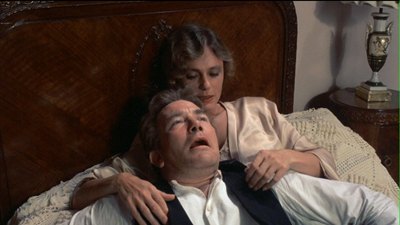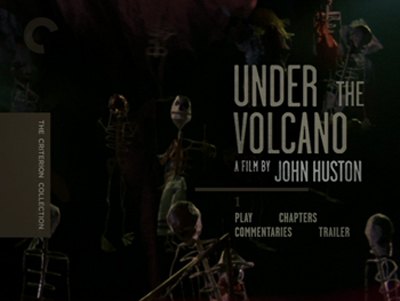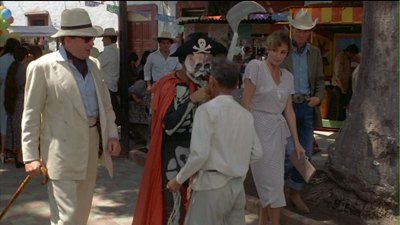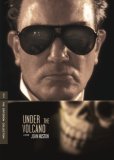| Reviews & Columns |
|
Reviews DVD TV on DVD Blu-ray 4K UHD International DVDs In Theaters Reviews by Studio Video Games Features Collector Series DVDs Easter Egg Database Interviews DVD Talk Radio Feature Articles Columns Anime Talk DVD Savant Horror DVDs The M.O.D. Squad Art House HD Talk Silent DVD
|
DVD Talk Forum |
|
|
| Resources |
|
DVD Price Search Customer Service #'s RCE Info Links |
|
Columns
|
|
|
Under the Volcano - Criterion Collection
THE MOVIE:

Mexico has always been very good to John Huston. He directed several movies set south of the border with consistently good results. In 1948, he shot Treasure of the Sierra Madre and showed what the pursuit of gold could do to a man's soul. In his 1984 film Under the Volcano, there is no tangible treasure being sought. The soul is already too far gone, everything else is immaterial. Or perhaps it's the soul itself that's being hunted for.
It's the Day of the Dead, and a drunken Englishman named Geoffrey Firmin (Albert Finney) wanders from bar to bar in search of more drink. Recently divorced, he's resigned his post as the British consul to Mexico, but it's not clear if either event is related or if these are the sorrows he seeks to drown. All that is obvious is that he is lost and heartbroken, stuck in a world that celebrates death without any real awareness of the consequences of it. It's 1938, and as veteran of WWI, he knows what war is--or so he says. His tales of his escapades grow larger the drunker he becomes, proving he's an unreliable source. (Is it possible he didn't resign as consul, even, but was defrocked?) Regardless, Geoffrey sees his country tumbling once more into a clash with the Germans and taking the rest of the world worth it. He even believes that the Nazis are funneling money into Mexico to form a political party there, a story his journalist brother, Hugh (Anthony Andrews), has come to Mexico to investigate.
Geoffrey is at the end of his tether. A well-meaning friend drags him to church to pray, but his efforts are pitiable. He can only manage to ask that his ex-wife, Yvonne (Jacqueline Bissett), return to him. It's possible the Virgin Mary heard his pleas, because Yvonne shows up at the bar where Geoffrey has chosen to greet the following morning. She escorts her husband home, shocked by his state of inebriation. It's hard to see her return as a blessing, though, more like divine retribution. Brother Hugh is also in town, having come to see his older sibling after dropping out of the Spanish Civil War (he was sympathetic to the Communists). Seeing his wife and his baby brother together is like being stuck between two live wires for Geoffrey. He believes that at one time they made a cuckold out of him.
It is here that Huston hangs Geoffrey out to further unravel. A day journey brings more alcohol, confrontations, and puts Geoffrey in the midst of the political turmoil he wisely advised Hugh to ignore. As night descends, the man gets more drunk and his situation gets more surreal. He shares drinks with midgets, whores, bandits, and a grim reaper or two. Geoffrey dreams of being William Blackstone, a frontiersman who walked unimpeded amongst the natives he studies; instead, Geoffrey has wandered into the abyss. The volcano metaphorically erupts.
John Huston pretty much had his movie as soon as he cast Albert Finney. Guy Gallo's script, adapting a novel by Malcolm Lowry, is verbose with drunken poetry. The part of Geoffrey demands that the actor feign high levels of intoxication at all times. Finney takes this on not just in his speech patterns, but in his physical presence, as well. He moves like heavy weights hang from invisible chains clamped to various parts of his body. The actor and his director revel in the morbid humor of the situation, the ridiculous things he says, the exaggerated reactions. Geoffrey's fellow Brits are all posh and mannered, seemingly above the surroundings they scamper through as tourists, whereas the Mexicans regard Geoffrey with the suspicion they would afford any outsider of this kind. To all of these people, he is either tragic or an opportunity. Whether they want to help him or rob him, it makes no difference, they all want to fleece him of something.
Under the Volcano was shot on location, using real Mexican towns rather than constructed sets. Huston must have seen the sparse reality of these places and realized that they would be different enough to the Western eye to stand as his figurative underworld. They appear to Geoffrey as the unexplored territories that Blackstone traveled to, full of friendly people and things to discover. Only it's already been discovered, civilization has been there, and the very concept of civilization has been rendered meaningless. The whole of everything seems to be slipping through Geoffrey's grasp. The tequila-soaked old man wants to take action, to do something to save the world, to do something for himself. Sadly, all he seems capable of is opening another bottle. The energy has been spent on drinks. What's left to do? Either wait it out or embrace the end.
The besotted man's final fate is, like the rest of the movie, buoyed on tiny pillows of comedy but ultimately tragic. Man wrestling with death would be a regular theme in Huston's later work. He was seventy-eight when he lensed Under the Volcano, likely grappling himself with the shifting movie business and its destruction of art for the sake of commerce. The great director was an old master who persevered through many different cycles of cinematic history, from the golden age of the studio system through the unleashed glories of the '60s and '70s. The blockbuster '80s would be his final act, and this is the movie that kicked it off, in its own way kicking against the system and what was probably expected of a director of his advanced age. Seeing this film, one can only conclude that Huston may have been under the volcano, but it was only so that he might push the lava out with his bare hands.

THE DVD
Video:
The Under the Volcano - Criterion Collection DVD is a brand-new transfer done with the help of the film's editor, Robert Silvi. Shown at a 1.78:1 aspect ratio, the picture is rich in color and detail. Spots and surface marks are gone, as are any jittery cuts or other issues. The image is strong throughout.
Sound:
The English-language soundtrack is cleaned up and presented in a mono soundtrack that should serve the original intention of the audio engineers. There audio is free of any noise or hiss, and the volume is mixed at appropriate levels.
There is also a Closed Captioning option.
Extras:
Under the Volcano - Criterion Collection is a two-disc DVD set. The first disc has the movie, the original theatrical trailer, and several audio commentaries. A very short track with Huston's son, the awesome actor Danny Huston, accompanies the first five minutes, as Danny directed the credits sequence and also was on-set for the entire production. He does an excellent imitation of his dad.
Screenwriter Guy Gallo recorded comments for a handful of scenes, including an audio-only introduction that sets up how he got involved with the project. Each scene in this commentary must be selected one at a time. This track is mainly about the difficulty of adapting such a respected, unconventional novel and how Gallo interacted with Huston to get to what the director wanted to achieve.
The only full-length commentary features the three producers of the film--executive producer Michael Fitzgerald and producers Wieland Schulz-Keil and Moritz Borman--who all recorded their parts separately. There is some overlap as far as information that is related by each, but the track is well edited and feels organic. With that many speakers participating, it also means that the discussion never flags. Out of the three, one of them always has something to say.
DVD 2 is the supplemental disc. It contains a variety of programs, including two interviews. A new video segment with Jacqueline Bissett, running just over 18 minutes, is quite good. The actress is still in awe of Huston and has fond memories of the film. Along with that is a half-hour audio interview with the director, recorded at the Cannes Film Festival in 1984. The old man is still full of vinegar and shows his scrappiness.
The making of the movie is thoroughly chronicled in the 1984 documentary Notes from "Under the Volcano", an hour-long making-of the likes of which we don't see anymore. Thought not on scope with Hearts of Darkness or The Making of "Fanny & Alexander", as a vintage behind-the-scenes movie, it has the same feeling of unguarded reality. In the DVD age, we don't really get this kind of honest on-set glimpse anymore. Now that these kinds of documentaries are so commonplace, you get the feeling everyone is on their best behavior for the camera, whereas in an older piece like this, they are just going about their business.
A documentary of a different stripe is the 99-minute Volcano: An Inquiry in the Life and Death of Malcolm Lowry. Nominated for a documentary Oscar in 1976, this fascinating portrait tries to get to the root of what made the author of Under the Volcano tick. It's a riveting portrait of a troubled life, and begs the question, is a novel of such magnitude worth the price of having lived it.
The standard booklet has photos and a new essay on the film by Christian Viviani, a French film professor.
FINAL THOUGHTS:
Highly Recommended. As suggested by the audio interview that accompanies the movie, Under the Volcano - Criterion Collection is the work of an old lion who still knows his way around the jungle. Adapting the difficult, insular novel by Malcolm Lowry, John Huston's movie casts Albert Finney as the British consul to Mexico on his drunken way down into a metaphorical underworld. Chased by the brother and wife he knows have made a fool of him, he runs from one drink to the next, either fleeing from death or pursuing it, the choice is really up to you. Finney portrays one of the silver screen's greatest alcoholics, and this two-disc set is besotted with many fabulous extras, matching the actor's excess gulp for gulp. Death and booze, isn't that why movie cameras were invented?

Jamie S. Rich is a novelist and comic book writer. He is best known for his collaborations with Joelle Jones, including the hardboiled crime comic book You Have Killed Me, the challenging romance 12 Reasons Why I Love Her, and the 2007 prose novel Have You Seen the Horizon Lately?, for which Jones did the cover. All three were published by Oni Press. His most recent projects include the futuristic romance A Boy and a Girl with Natalie Nourigat; Archer Coe and the Thousand Natural Shocks, a loopy crime tale drawn by Dan Christensen; and the horror miniseries Madame Frankenstein, a collaboration with Megan Levens. Follow Rich's blog at Confessions123.com.
|
| Popular Reviews |
| Sponsored Links |
|
|
| Sponsored Links |
|
|
| Release List | Reviews | Shop | Newsletter | Forum | DVD Giveaways | Blu-Ray | Advertise |
|
Copyright 2024 DVDTalk.com All Rights Reserved. Legal Info, Privacy Policy, Terms of Use,
Manage Preferences,
Your Privacy Choices | |||||||













